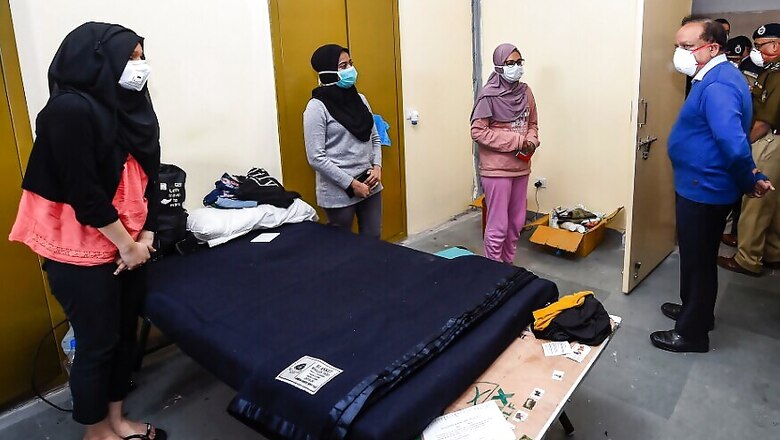
views
New Delhi: Inaya Bhandari is eager to play. Play with the Indo-Tibetan Border Police (ITBP) jawans on duty. The two-year-old tugs at their weapons and salutes them on cue. It doesn’t matter to her that her parents are eager to leave their current abode for their family home in Rishikesh.
Inaya’s father Dhiren is a yoga teacher in China. The entire family was evacuated from Wuhan and, after 17 days in quarantine at the ITBP Chhawla facility, has been given the green signal to go home. Dhiren is all praise for the way the Indian embassy in China pulled them out and the care by the security personnel, but finds it difficult to forget the trauma before evacuation.
“Those were tough times, especially with the child. We were concerned about her. Since January 23 everything was shut after their new year began...Metro was shut, airport was shut, only small shops remained open and we could get some food items,” he recalls.
The highways had been closed using sandbags and stones, third-year medical student Naushin Nabi adds. “No movement was being allowed,” she says.
Naushin and 32 other Kashmiri students are ready to go home after a team of doctors screened them three times for coronavirus and found the reports negative. She is thankful for having escaped the deadly disease but worries about friends left behind at the university campus.
“We had friends from Pakistan, from Sudan, and from other African countries. They still are there on campus. First our Chinese friends would send messages about how bad the situation was outside the university campus. Then the university officials announced closure. We weren't allowed to go anywhere. The mess was open only because of us and food would be left outside our rooms. It was horrible,” she says.
But, thankfully for Naushin and the others, evacuation happened swiftly. “The Indian government was the first to move with the rescue. The highway blockades were removed in seven minutes when the embassy officials showed the pass. I am very proud to be an Indian passport holder,” Naushin says, before leaving for Budgam in Jammu and Kashmir.
The comparison between the Indian response and that of other countries was the topic of conversation in a number of huddles at the wet canteen of the ITBP facility.
Kashmiri medical student Zukra Hasan told CNN-News18: “As a Kashmiri, I appreciate what the government did...For the first time, it felt as a Kashmiri that India cares for us too. Our friends from Pakistan had no such support. Humanity comes first. I wish the government of Pakistan did something for them.”
A total of 406 people, including 192 women, 204 men and seven children were evacuated from China and kept at the ITBP Chhawla camp for 17 days. Doctors say they took precaution beyond the usually required quarantine of 14 days. All inmates were screened three times and were given discharge certificates only after they tested negative in all of them.
The group included seven Maldivian nationals. A team of 44 doctors including psychiatrists, psychologists, and specialists in quarantine facilities looked after the group. Chief Medical Officer Dr AP Joshi, who has been with the ITBP since 1997, calls this his toughest assignment till date.
“We were given two days to get this facility ready. There was no electricity and water connection then. The building was barely ready. Plus, there was the complication of the virus itself. My 82-year-old father would call me three times a day to check. My juniors and friends were all worried for my safety. But we managed it all successfully. Words are not enough to describe the feelings right now,” Dr Joshi tells CNN-News18 amid preparations to send off the inmates.
About 100 people left the quarantine facility on Monday and most who spoke to CNN-News18 said they would want to go back to China once the outbreak is controlled. But, for now, they are grateful to have survived the deadly epidemic.


















Comments
0 comment